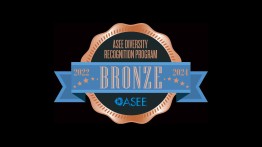School of Engineering Awarded ASEE's Highest Recognition for Diversity
POSTED ON: January 18, 2022

The Cooper Union Albert Nerken School of Engineering has been selected by the American Society for Engineering Education (ASEE) for its Bronze-level recognition, the highest level issued in this application cycle, as part of the ASEE Diversity Recognition Program (ADRP). The program was established to publicly recognize engineering and engineering technology colleges that make significant, measurable progress in increasing the diversity, inclusion, and degree attainment outcomes of their programs.
Out of twelve fall 2021 applicants, the School of Engineering was one of nine that received the prestigious Bronze recognition, distinguishing it as being among the nation’s leaders in inclusive excellence. According to the ADRP, Bronze awardees are evaluated on several criteria, including a commitment to supporting groups underrepresented in engineering; implementing programs and initiatives that strengthen the K-12 pipeline and reduce barriers related to long-term growth; analyzing and assessing school policies, composition, and culture related to all underrepresented groups in engineering; and developing an action plan focused on continuous improvement.
“This external peer review and recognition from ASEE confirms our college’s commitment to advancing diversity, equity, and inclusion and inspires us to continue to improve the climate we are striving for at Cooper,” says Barry Shoop, dean of the Albert Nerken School of Engineering.
The journey to achieving this recognition began with two Diversity, Equity, and Inclusion Town Halls hosted by the School of Engineering over the Spring 2021 semester. During these meetings, students, faculty, and staff reviewed the institution’s 2018 Diversity and Inclusion Task Force Report recommendations, which were led by co-chairs of the task force Sam Keene, professor of electrical engineering, and Toni Torres, Cooper’s vice president of institutional effectiveness.
The application to the ADRP consisted of a diversity, equity, and inclusion plan; demographic data; and a narrative describing the school of engineering’s ongoing activities, programs, and initiatives that advance the recommendations of the task force and are reflective of The Cooper Union’s historic mission of fair access to education. The narrative and plan both address five key areas identified by Cooper’s Diversity and Inclusion Task Force: culture and climate, compositional diversity, inclusive pedagogy and practice, first year experience, and diversity of faculty and staff.
“Diversity is a means by which problem solving, creative, civic, and social engagements yield transformative thinking,” the task force wrote in their 2018 report. “[I]t is an essential value upon which the curriculum and degree quality build. That under-represented populations (low income, first generation, racial and ethnic minorities, and women) have an opportunity to avail themselves of the unique educational and post- graduation benefits provided by Cooper Union, a highly selective institution, is a crucial social and ethical priority. For Cooper Union, diverse students can contribute to the intellectual and experiential tensions that engender new and critical approaches that shape both the institution and its students alike.”
“Much has been done since the 2018 D&I Task Force Report but there remains more to be done,” Dean Shoop says. “This is a journey rather than a destination—one that we must all take together.”




